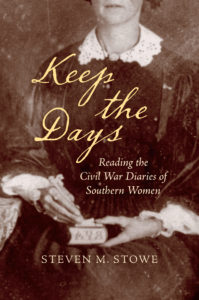Steven M. Stowe: Lives Written Larger than War
 Today we welcome a guest post from Steven M. Stowe, author of Keep the Days: Reading the Civil War Diaries of Southern Women, out now from UNC Press.
Today we welcome a guest post from Steven M. Stowe, author of Keep the Days: Reading the Civil War Diaries of Southern Women, out now from UNC Press.
Americans wrote fiercely during the Civil War. War surprised, devastated, and opened up imagination, taking hold of Americans’ words as well as their homes and families. The personal diary—wildly ragged yet rooted in day following day—was one place Americans wrote their war. Diaries, then, have become one of the best-known, most-used sources for exploring the life of the mind in a war-torn place and time. Delving into several familiar wartime diaries kept by women of the southern slave-owning class, Steven Stowe recaptures their motivations to keep the days close even as war tore apart the brutal system of slavery that had benefited them. Whether the diarists recorded thoughts about themselves, their opinions about men, or their observations about slavery, race, and warfare, Stowe shows how these women, by writing the immediate moment, found meaning in a changing world.
Keep the Days is now available in both print and ebook editions.
###
Lives Written Larger than War
When it comes to the history of U.S. Civil War, we think of personal diaries as among the key sources. A diary is an especially readable text, colorful and down-to-earth. A soldier, a mistress of slaves, an army surgeon—each has a war story to tell. And all tell the war plot: the Big War sweeping up their lives and changing them.
But is this what diarists write? Is this what diaries do? Yes and no. Diarists do show how the war blew destruction into their lives. They show stirring change, too, and new times coming. I started reading diaries for this, looking for the war plot and how individuals fit their lives inside monster war. But diaries also do the opposite. A diary is a kind of perpetual first draft of the ordinary. Even in war, the homely weight of a diarist’s habits and heart serve to fit war into her life. Amazingly, on the page, we see that her life is larger than the war.
This can pose a problem for editors—and readers—who want the excitement of the Big War plot. I like it, too, but I’ve learned to like even more how the diary makes its own, patient and watchful way through the writer’s days. Diaries are good at putting the war off-center and not cutting to the chase. Some editors are impatient with the diary’s way, and this has consequences for what we read when we read published war diaries.
An example will explain. Sarah Morgan, a Louisianan in her early 20s, wrote one of the most-read Civil War diaries, one that has found a happy home well-edited and published in full. But for many decades, the only way to read Morgan in print was to read a volume edited by her son Warrington Dawson, who silently cut many passages and re-wrote many others, all the while pledging fidelity to his mother’s words. Dawson lamented Confederate defeat, but he loved the Big War. The diary gripped him because it shed light on the nation’s drama, not because it showed how a young woman wrote her wartime world. In his version, Morgan’s 1865 diary ends with this sentence: “Our Confederacy has gone with one crash—the report of the pistol fired at Lincoln.” It’s dramatic and dead-center on the war plot: a young woman witnessing war’s end-game.
Except this isn’t how Sarah Morgan’s diary ends. She did write the above sentence in her volume’s final entry. But she went on writing for more than a page, words her son deleted. Words ordinary and frank, the diary’s way. She wrote of her sister and of friends and family on the move. She wrote of men—men she had almost loved in wartime, or who had loved her. She wrote about one such man who shows up at her door in 1865, surprising her. She is delighted to see him, and writes what in fact became her last war-diary words, her pleasure at seeing this man’s “good, honest face.” This face, not Lincoln’s death, ends this diary in the way most war diaries end. Not with the turnings of the big war’s plot, but with the turnings of the diarist’s day, and because, at a certain moment on a certain day, she just stopped writing. The diary patiently carries all of this to us, letting us see the sustaining weight of everyday life amid the shocks of war.
###
Steven M. Stowe is professor emeritus of history at Indiana University, Bloomington. You can read his earlier UNC Press Blog posts here.

You must be logged in to post a comment.